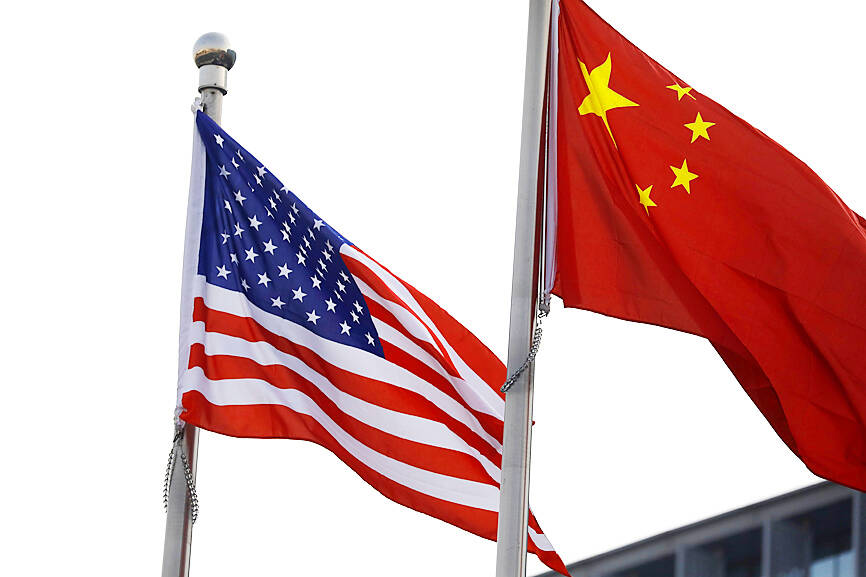A majority of Taiwanese aged 20 or older said they believe that supporting US policies that seek to diminish China’s global influence is necessary to meet national interests, a poll released yesterday showed.
A majority of potential voters polled said they believe Taipei should make common cause with Washington, Taiwanese Public Opinion Foundation chairman Michael You (游盈隆) said in a statement.
The survey showed that 61.1 percent of respondents said they believe Taiwan and the US share common interests and that US policies aimed at countering China are necessary for Taiwan.

Photo: Reuters
About 17.9 percent of respondents said they strongly agreed and 43.2 said they somewhat agreed, while about 21.7 percent disagreed, including 12.6 percent who strongly disagreed and 9.7 percent who somewhat disagreed.
The survey showed that 58.6 percent of respondents agreed that warming ties between Taipei and Washington reflected the rise in importance of the nation to the interests of the US, which do not always benefit Taiwan.
About 23.7 percent said they strongly agreed and 34.9 percent said they somewhat agreed, while 25.8 percent disagreed, including 8.5 percent who strongly disagreed and 17.3 percent who somewhat disagreed.
The findings show that a large majority of potential voters believe the nation’s interests are aligned with the US’, while only a minority support Beijing, You said, adding that China-aligned voters are outnumbered three to one in the poll.
The public has a consensus about the nature of Taiwan-US relations being contingent on US interest in the region, he said.
Following the Chinese Nationalist Party’s (KMT) victories in last year’s local elections, it and opinion makers have increasingly leaned into characterizing next year’s general election as a choice between war and peace, the foundation said in a statement.
Taiwanese voters have strong opinions about the factors that could trigger a military conflict with China, and they are unlikely to be swayed by any political party, it said.
When asked whether they agree or disagree with the statement that electing a Democratic Progressive Party (DPP) candidate means choosing war, while electing a KMT nominee means choosing peace, 68.6 percent of respondents said they disagreed.
About 30.1 percent said they strongly disagreed and 38.5 percent said they somewhat disagreed, the poll showed.
Meanwhile, 18.9 percent said they agreed with the statement, including 9 percent who strongly agreed and 9.9 percent who somewhat agreed.
Framing the KMT as the party of peace and the DPP as advocating war is divisive, and supporters of other political parties and even a large swathe of the KMT itself rejects this framing, the foundation said.
About 65 to 90 percent of self-identified supporters of the DPP, Taiwan People’s Party and Taiwan Statebuilding Party, and about 40 percent of KMT supporters said they disagreed with the statement, the poll showed.
About 57 percent of self-identified independent voters said they strongly or partly disagreed with the statement, while 11 percent agreed, it added.
A KMT strategy to play up fears of war with China — adopted with almost no internal debate or controversy — suggests that the party leadership is out of touch with mainstream opinions, the foundation said.
The poll, conducted by Focus Survey Research on Tuesday and Wednesday last week, was based on 1,073 landline telephone interviews with Taiwanese aged 20. It claimed a margin of error of 2.99 percentage points.

The brilliant blue waters, thick foliage and bucolic atmosphere on this seemingly idyllic archipelago deep in the Pacific Ocean belie the key role it now plays in a titanic geopolitical struggle. Palau is again on the front line as China, and the US and its allies prepare their forces in an intensifying contest for control over the Asia-Pacific region. The democratic nation of just 17,000 people hosts US-controlled airstrips and soon-to-be-completed radar installations that the US military describes as “critical” to monitoring vast swathes of water and airspace. It is also a key piece of the second island chain, a string of

A magnitude 5.9 earthquake that struck about 33km off the coast of Hualien City was the "main shock" in a series of quakes in the area, with aftershocks expected over the next three days, the Central Weather Administration (CWA) said yesterday. Prior to the magnitude 5.9 quake shaking most of Taiwan at 6:53pm yesterday, six other earthquakes stronger than a magnitude of 4, starting with a magnitude 5.5 quake at 6:09pm, occurred in the area. CWA Seismological Center Director Wu Chien-fu (吳健富) confirmed that the quakes were all part of the same series and that the magnitude 5.5 temblor was

Taiwan will now have four additional national holidays after the Legislative Yuan passed an amendment today, which also made Labor Day a national holiday for all sectors. The Chinese Nationalist Party (KMT) and Taiwan People’s Party (TPP) used their majority in the Legislative Yuan to pass the amendment to the Act on Implementing Memorial Days and State Holidays (紀念日及節日實施辦法), which the parties jointly proposed, in its third and final reading today. The legislature passed the bill to amend the act, which is currently enforced administratively, raising it to the legal level. The new legislation recognizes Confucius’ birthday on Sept. 28, the

The Central Weather Administration has issued a heat alert for southeastern Taiwan, warning of temperatures as high as 36°C today, while alerting some coastal areas of strong winds later in the day. Kaohsiung’s Neimen District (內門) and Pingtung County’s Neipu Township (內埔) are under an orange heat alert, which warns of temperatures as high as 36°C for three consecutive days, the CWA said, citing southwest winds. The heat would also extend to Tainan’s Nansi (楠西) and Yujing (玉井) districts, as well as Pingtung’s Gaoshu (高樹), Yanpu (鹽埔) and Majia (瑪家) townships, it said, forecasting highs of up to 36°C in those areas